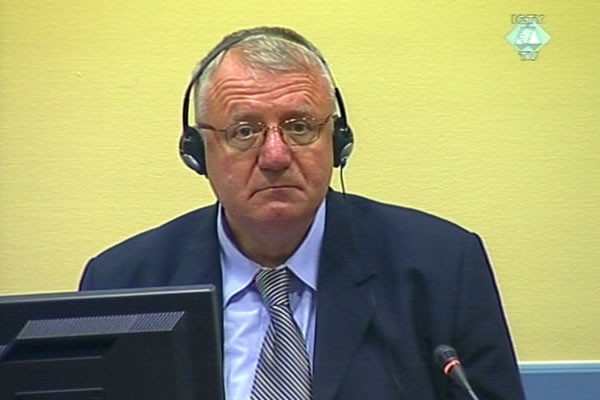Home
PROSECUTION CALLS FOR SESELJ JUDGMENT IN ‘REASONABLE TIME’
The prosecution proposes that Vojislav Seselj’s trial continue from the point where it was suspended: just as the judgment was about to be rendered. The trial should resume as soon as possible, or rather, as soon as the new judge in the Trial Chamber is familiarized with the case. The prosecution has noted that there are precedents for new judges joining the trials that are already underway: the trials of Slobodan Milosevic and Momcilo Krajisnik
 Vojislav Seselj u sudnici Tribunala
Vojislav Seselj u sudnici Tribunala In response to the Trial Chamber’s invitation to the parties to present their proposals about the resumption of the proceedings against the Serbian Radical Party leader Vojislav Seselj, the prosecution has proposed steps that could lead to the judgment in ‘reasonable time’. Seselj is charged with crimes against non-Serbs in Croatia, Vojvodina and BH. The trial has been on hold since August 2013 when Seselj’s request to disqualify Judge Harhoff was granted. As a consequence, the judgment slated to be handed down on 30 October 2013 was postponed and Judge Niang was appointed as the new member of the Trial Chamber.
Contrary to the claims Seselj made in his motion last week, that the new judge couldn’t participate in a trial which he did not attend at all, ‘not a single day’, the prosecution argues that the Tribunal’s practice makes it possible for the judges in the trial chambers to be reshuffled. The prosecution recalls that when Judge May retired from the Trial Chamber in the Slobodan Milosevic case, Judge Bonomy took his place in the Trial Chamber. The trial continued after a little over four months, after Judge Bonomy familiarized himself with the case. By that time, the judges had heard the testimony of 358 witnesses. In Seselj’s case, the court heard only 97 witnesses. Also, a new judge was appointed to Momcilo Krajisnik’s trial chamber.
The accused has objected to the resumption of the trial, claiming that the new judge would not be able to assess the credibility of the witnesses because he hadn’t observed the ‘external effects’ of their testimonies, or their behavior in court. The prosecution replies that, in addition to the transcripts, the new judge will have at his disposal the audio and video recordings. In the prosecution’s view, the ‘speculations’ of the accused about the ability of Judge Niang to learn about the case are ‘immature and irrelevant’. Seselj has called for an end of the criminal proceedings against him and damages to the amount of 12 million euros.
Opposing the request to end the trial, the prosecution notes that Seselj’s allegations about the violations of his rights at the Tribunal are ‘groundless’. The judges have already rejected such allegations before, the prosecution stresses. For example, the Trial Chamber has concluded that there was no ‘unreasonable postponement’ of the proceedings. The prosecution also recalls that the behavior of the accused, which often crossed the boundaries of ‘legal procedure’, is one of the reasons why the trial had to be delayed time and again.
The prosecution has therefore proposed the following steps: first, the Trial Chamber should order the proceedings to resume, and grant the parties 14 days for any appeals. The judges should resume their deliberations and deliver their judgment when Judge Niang notifies them he is familiar with the case. Finally, the trial judgment should be handed down ‘in reasonable time’.
Linked Reports
- Case : Seselj
- 2013-11-28 SESELJ MAY REAP REWARDS OF PERSISTENCE AGAIN
- 2013-11-14 NEW DEVELOPMENTS IN SESELJ CASE
- 2013-10-31 SESELJ’S TRIAL CHAMBER FINALLY COMPLETE
- 2013-12-16 SESELJ JUDGMENT WILL NOT BE DELIVERED BEFORE SECOND HALF OF 2014
- 2014-01-24 PROSECUTION OPPOSES SESELJ'S MOTION TO STAY PROCEEDINGS
- 2014-02-14 APPEALS CHAMBER TO RULE ON SESELJ’S MOTION TO TERMINATE PROCEEDINGS
